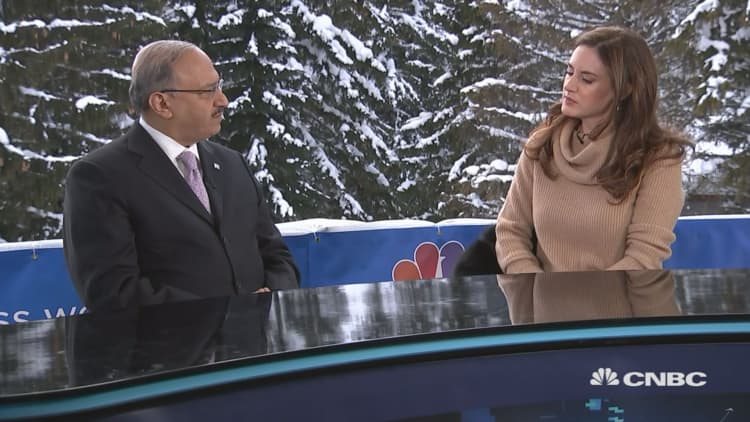RIYADH — A high-level committee of Saudi Basic Industries Corporation (Sabic) executives are working on a post-Aramco IPO (initial public offering) strategy, including possible acquisitions, as the kingdom puts the final touches on the critical stock market offering.
"I am very optimistic," Sabic Vice Chairman and CEO, Yousef Al Benyan, told a small roundtable of reporters at its headquarters in Riyadh on Sunday.
"If Aramco becomes 70% shareholder of the company and Sabic becomes the chemical arm of Aramco and the kingdom, this is going to push the company out in front," he said.
Sabic, the world's third-largest chemical company with 33,000 employees in 50 countries, is looking to boost its own transparency, find synergies and drive growth after the Aramco IPO. In a series of closed room briefings at its headquarters, senior executives — including the firm's corporate finance and petrochemicals boss — worked to clarify the future structure for the business once Aramco goes live.
"We don't use the word integration," Al Benyan said. "There are some misconceptions around the relationship in the future between Aramco and Sabic, but Sabic will remain a publicly-listed company," he added.
Antitrust review
Aramco agreed to buy a 70% stake in Sabic from Saudi Arabia's Public Investment Fund (PIF) in March for $69.1 billion, providing a major cash injection for the PIF and a potential boost for Aramco's downstream operations if the two were to combine. The share purchase remains subject to various closing conditions and regulatory approvals. The deal between the three entities was seen as moving money from one pocket of the Saudi state to another, given the government will remain their ultimate owner.

"We will be negotiating with Aramco on which of their assets will be acquired by Sabic," Al Benyan said, suggesting instead there will be a clear division between the chemical operations of Saudi Arabia's two largest companies.
"We have not been able to identify them at this point because we have no access to them, and we are going through the antitrust right now," he added. "As soon as the antitrust is completed, we need to sit down together and create a synergy committee that is going to drive the value between both companies," he said, saying the review should be completed no later than the first quarter of 2020.
"I'm not worried about how Sabic is going to operate in the future," Al Benyan added.
The successful IPO of Aramco is seen as critical for Saudi Arabia's economy and society. However, progress has slowed in recent months with international investors questioning its touted $2 trillion valuation.
Africa investment
Sabic executives say major projects in its core division of petrochemicals, where it's a global leader in the production of polycarbonates, are continuing as planned. It wants to grow its agri-nutrients fertilizer business 80% by 2025, and is investing further to claim a leadership position in specialty chemicals — despite worries over the state of the global economy.
"There is a big trend against free trade and globalization, unfortunately being fueled by politicians not only in emerging markets but in developed markets too," Al Benyan said. "This could really slow down the economy," he warned.
Executives identified key growth markets in the United States, Latin America and specifically in Africa — where talks on a major transaction have been underway for the last 12 months.
"If you asked me today if I was willing to acquire a petrochemical company in Africa or in Latin America, I would tell you no," he said. "But are you willing to acquire a solutions company? That's a different story," he hinted. "Hopefully from Q1 (the first quarter) next year, we will have something to announce in Africa," Al Benyan added, suggesting that the transaction would be worth around $2 billion, but stopped short of providing additional details.
The company posted a net profit of 830 million riyals ($221 million) in the quarter ending September 30, down from 6.1 billion riyals in the same quarter a year earlier. The company took an impairment loss of 1.5 billion riyals on its investment in Swiss chemicals firm Clariant, which resulted in an 86% drop in its third-quarter net profit.
Correction: This story has been updated to reflect the correct name for Saudi Basic Industries Corporation (Sabic).


